外研版(2019) 选择性必修第一册 Unit 1 Laugh out Loud! Grammar课件15张
文档属性
| 名称 | 外研版(2019) 选择性必修第一册 Unit 1 Laugh out Loud! Grammar课件15张 | 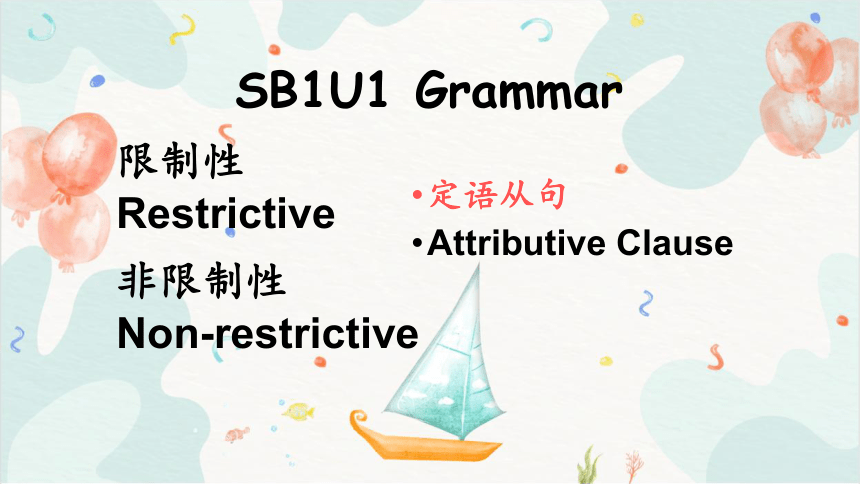 | |
| 格式 | pptx | ||
| 文件大小 | 1.8MB | ||
| 资源类型 | 教案 | ||
| 版本资源 | 外研版(2019) | ||
| 科目 | 英语 | ||
| 更新时间 | 2022-10-09 17:18:09 | ||
图片预览

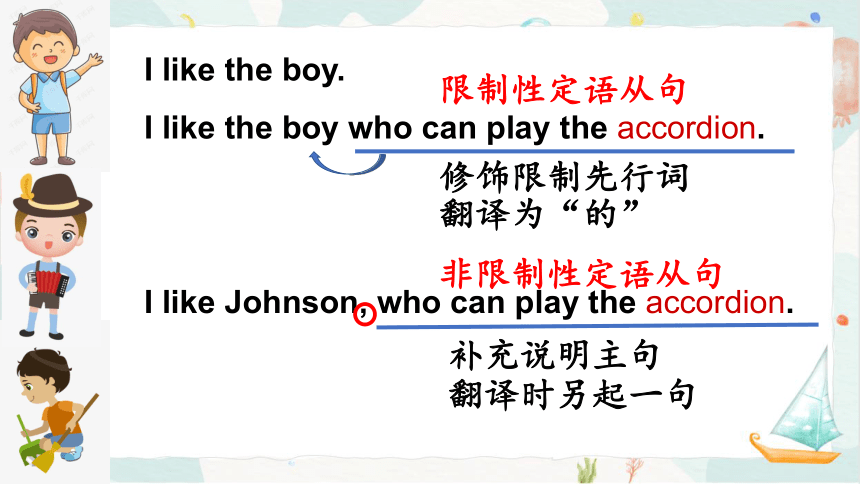
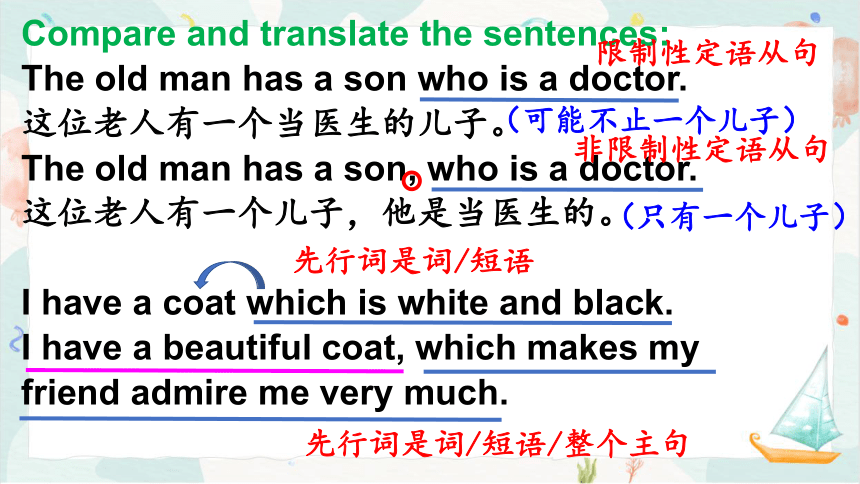
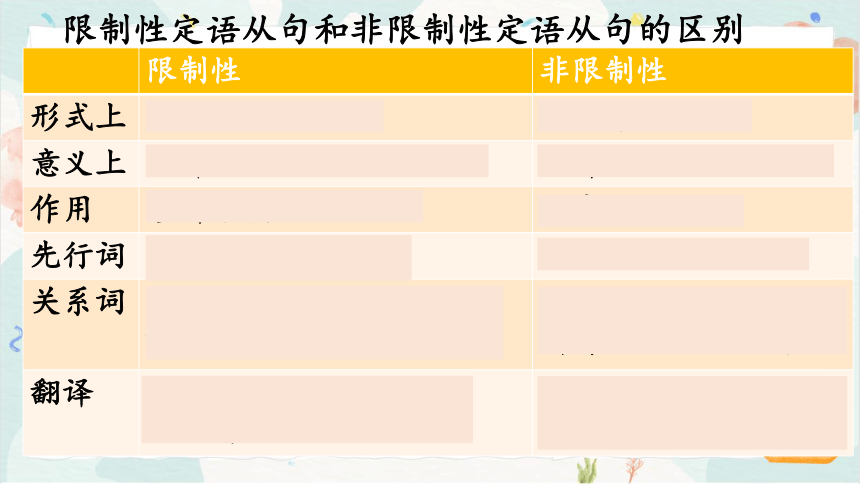
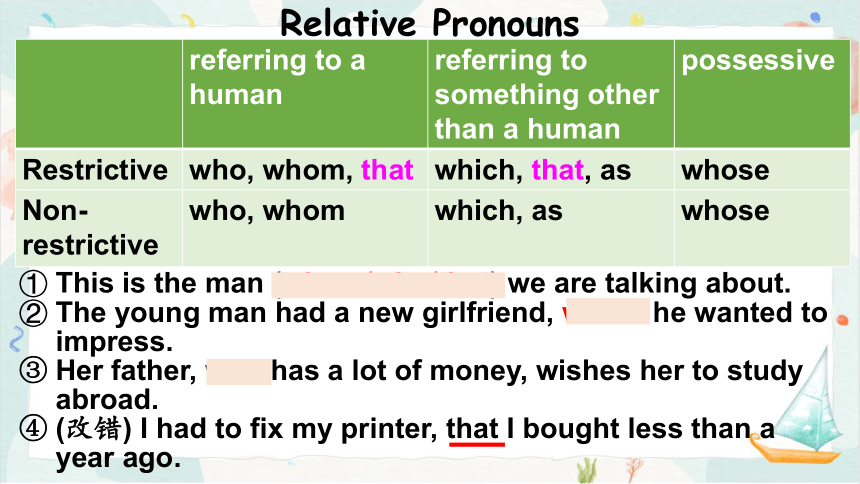
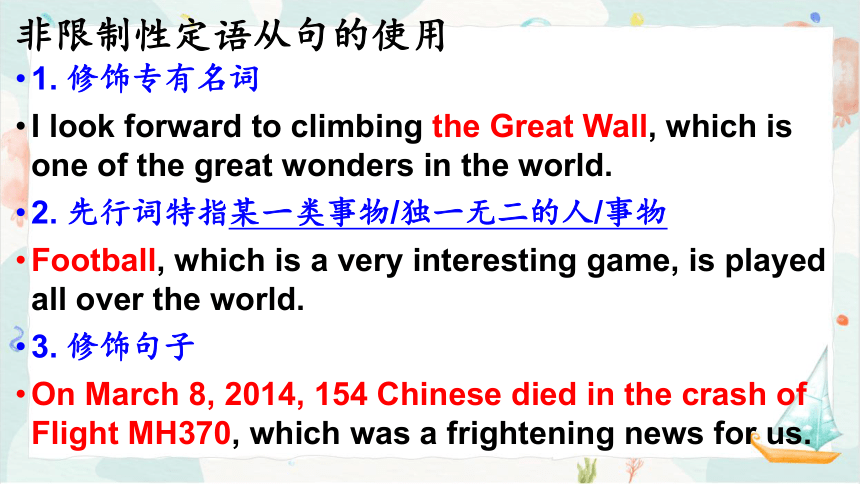
文档简介
(共13张PPT)
SB1U1 Grammar
定语从句
Attributive Clause
限制性
Restrictive
非限制性
Non-restrictive
I like the boy.
I like the boy who can play the accordion.
I like Johnson, who can play the accordion.
限制性定语从句
修饰限制先行词
翻译为“的”
非限制性定语从句
补充说明主句
翻译时另起一句
Compare and translate the sentences:
The old man has a son who is a doctor.
这位老人有一个当医生的儿子。
The old man has a son, who is a doctor.
这位老人有一个儿子,他是当医生的。
I have a coat which is white and black.
I have a beautiful coat, which makes my friend admire me very much.
(可能不止一个儿子)
(只有一个儿子)
限制性定语从句
非限制性定语从句
先行词是词/短语
先行词是词/短语/整个主句
限制性定语从句和非限制性定语从句的区别
限制性 非限制性
形式上 不用逗号 用逗号
意义上 去掉后主句意思不完整 去掉后主句意思完整
作用 修饰限制 补充说明
先行词 词(n/pron)/短语 词/短语/整个主句
关系词 关代作宾时可省 whom作宾时可用who代 不用that, why引导
所有关代均不可省
翻译 先译从句再译先行词, ……的…… 先译先行词后译从句,形成两个分句
Relative Pronouns
referring to a human referring to something other than a human possessive
Restrictive who, whom, that which, that, as whose
Non-restrictive who, whom which, as whose
This is the man (whom/who/that) we are talking about.
The young man had a new girlfriend, whom he wanted to impress.
Her father, who has a lot of money, wishes her to study abroad.
(改错) I had to fix my printer, that I bought less than a year ago.
非限制性定语从句的使用
1. 修饰专有名词
I look forward to climbing the Great Wall, which is one of the great wonders in the world.
2. 先行词特指某一类事物/独一无二的人/事物
Football, which is a very interesting game, is played all over the world.
3. 修饰句子
On March 8, 2014, 154 Chinese died in the crash of Flight MH370, which was a frightening news for us.
Fill in the blanks. Add prepositions or commas if necessary.
Many years ago, there was a clergyman(神职人员) ________ name is John. He had to go from one place to another ________ he could meet his fellowmen. Therefore, he missed his mum very much, ________ lived alone in London.
John tried hard to help all his fellowmen, but he soon met with many difficulties, ________ the most serious was his clothing. As a clergyman, he had to be in black all day long, a colour ________ often frightened some of his fellowmen, especially children. He really hated it. Finally, John made up his mind and said, “I will wear no clothes ________ will distinguish me from my fellowmen.”
A few days later, a reporter heard of John’s words and put them on the newspaper, ________ brought John some unexpected trouble.
whose
where
who
of which
that/which
that
which
介词+关系词
In the dark street, there wasn’t a single person_________ she could turn for help.
to whom
The factory _________ his father works is faraway from my hometown.
in which
This is Mr. Smith, _________ factory we work.
in whose
We stood at the top of the hill, ___________ we can see the town.
from where
定语从句在书面表达中的使用
1. 她是一位年轻的护士,去年刚参加工作.
She is a young nurse, who just started to work last year.
2. 我能胜任这份工作的原因如下。
The reason why I’m qualified for the job are as follows.
3. 另外,我能同时说流利的中英文,这使得我和来自世界各地的游客交流都没有问题。
Furthermore, I can speak fluent Chinese and English at the same time, which makes it no problem for me to communicate with visitors from all over the world.
定语从句与强调句型的区别
定语从句对名词或代词的修饰和限制,关系词可能是that, which, as, who, but, 另一方面,句子中的It有所指。
强调句型是对某部分加强语气,强调语气的连接词只能是that, who,并且句子中的It 没有任何意义。
一般比较明显,而有时就难以区别,还需要根据上下文的语境来判断。
It is a book that he wants.
如果它是用来回答What is this / that 这样的问题,意思是:它是一本他想要的书。句子显然是定语从句。如果是用来回答What does he want 这样的问题,那么意思是:他想要的是一本书。显然,句子是强调句型。
It was at the school ________ was named after a hero ________ he spent his childhood.
It was in the village ________ he once lived ________ he got his junior education.
which
that
where
that
Practice
定语从句与结果状语从句的区别
定语从句中的关系词在从句中还要作某种成分,因而从句成分不完整;而结果状语从句中的连接词不作任何句子成分,因此句子成分完整。
It is such an interesting book as we all like.
它是我们大家都喜欢的如此有趣的书。(定语从句)
It is such an interesting book that we all like it.
它是一本如此有趣的书,我们大家都喜欢它。(结果状语从句)
It is such an interesting book that we all like.
我们大家都喜欢的是一本如此有趣的书。(强调句型)
Thank you~~
SB1U1 Grammar
定语从句
Attributive Clause
限制性
Restrictive
非限制性
Non-restrictive
I like the boy.
I like the boy who can play the accordion.
I like Johnson, who can play the accordion.
限制性定语从句
修饰限制先行词
翻译为“的”
非限制性定语从句
补充说明主句
翻译时另起一句
Compare and translate the sentences:
The old man has a son who is a doctor.
这位老人有一个当医生的儿子。
The old man has a son, who is a doctor.
这位老人有一个儿子,他是当医生的。
I have a coat which is white and black.
I have a beautiful coat, which makes my friend admire me very much.
(可能不止一个儿子)
(只有一个儿子)
限制性定语从句
非限制性定语从句
先行词是词/短语
先行词是词/短语/整个主句
限制性定语从句和非限制性定语从句的区别
限制性 非限制性
形式上 不用逗号 用逗号
意义上 去掉后主句意思不完整 去掉后主句意思完整
作用 修饰限制 补充说明
先行词 词(n/pron)/短语 词/短语/整个主句
关系词 关代作宾时可省 whom作宾时可用who代 不用that, why引导
所有关代均不可省
翻译 先译从句再译先行词, ……的…… 先译先行词后译从句,形成两个分句
Relative Pronouns
referring to a human referring to something other than a human possessive
Restrictive who, whom, that which, that, as whose
Non-restrictive who, whom which, as whose
This is the man (whom/who/that) we are talking about.
The young man had a new girlfriend, whom he wanted to impress.
Her father, who has a lot of money, wishes her to study abroad.
(改错) I had to fix my printer, that I bought less than a year ago.
非限制性定语从句的使用
1. 修饰专有名词
I look forward to climbing the Great Wall, which is one of the great wonders in the world.
2. 先行词特指某一类事物/独一无二的人/事物
Football, which is a very interesting game, is played all over the world.
3. 修饰句子
On March 8, 2014, 154 Chinese died in the crash of Flight MH370, which was a frightening news for us.
Fill in the blanks. Add prepositions or commas if necessary.
Many years ago, there was a clergyman(神职人员) ________ name is John. He had to go from one place to another ________ he could meet his fellowmen. Therefore, he missed his mum very much, ________ lived alone in London.
John tried hard to help all his fellowmen, but he soon met with many difficulties, ________ the most serious was his clothing. As a clergyman, he had to be in black all day long, a colour ________ often frightened some of his fellowmen, especially children. He really hated it. Finally, John made up his mind and said, “I will wear no clothes ________ will distinguish me from my fellowmen.”
A few days later, a reporter heard of John’s words and put them on the newspaper, ________ brought John some unexpected trouble.
whose
where
who
of which
that/which
that
which
介词+关系词
In the dark street, there wasn’t a single person_________ she could turn for help.
to whom
The factory _________ his father works is faraway from my hometown.
in which
This is Mr. Smith, _________ factory we work.
in whose
We stood at the top of the hill, ___________ we can see the town.
from where
定语从句在书面表达中的使用
1. 她是一位年轻的护士,去年刚参加工作.
She is a young nurse, who just started to work last year.
2. 我能胜任这份工作的原因如下。
The reason why I’m qualified for the job are as follows.
3. 另外,我能同时说流利的中英文,这使得我和来自世界各地的游客交流都没有问题。
Furthermore, I can speak fluent Chinese and English at the same time, which makes it no problem for me to communicate with visitors from all over the world.
定语从句与强调句型的区别
定语从句对名词或代词的修饰和限制,关系词可能是that, which, as, who, but, 另一方面,句子中的It有所指。
强调句型是对某部分加强语气,强调语气的连接词只能是that, who,并且句子中的It 没有任何意义。
一般比较明显,而有时就难以区别,还需要根据上下文的语境来判断。
It is a book that he wants.
如果它是用来回答What is this / that 这样的问题,意思是:它是一本他想要的书。句子显然是定语从句。如果是用来回答What does he want 这样的问题,那么意思是:他想要的是一本书。显然,句子是强调句型。
It was at the school ________ was named after a hero ________ he spent his childhood.
It was in the village ________ he once lived ________ he got his junior education.
which
that
where
that
Practice
定语从句与结果状语从句的区别
定语从句中的关系词在从句中还要作某种成分,因而从句成分不完整;而结果状语从句中的连接词不作任何句子成分,因此句子成分完整。
It is such an interesting book as we all like.
它是我们大家都喜欢的如此有趣的书。(定语从句)
It is such an interesting book that we all like it.
它是一本如此有趣的书,我们大家都喜欢它。(结果状语从句)
It is such an interesting book that we all like.
我们大家都喜欢的是一本如此有趣的书。(强调句型)
Thank you~~
